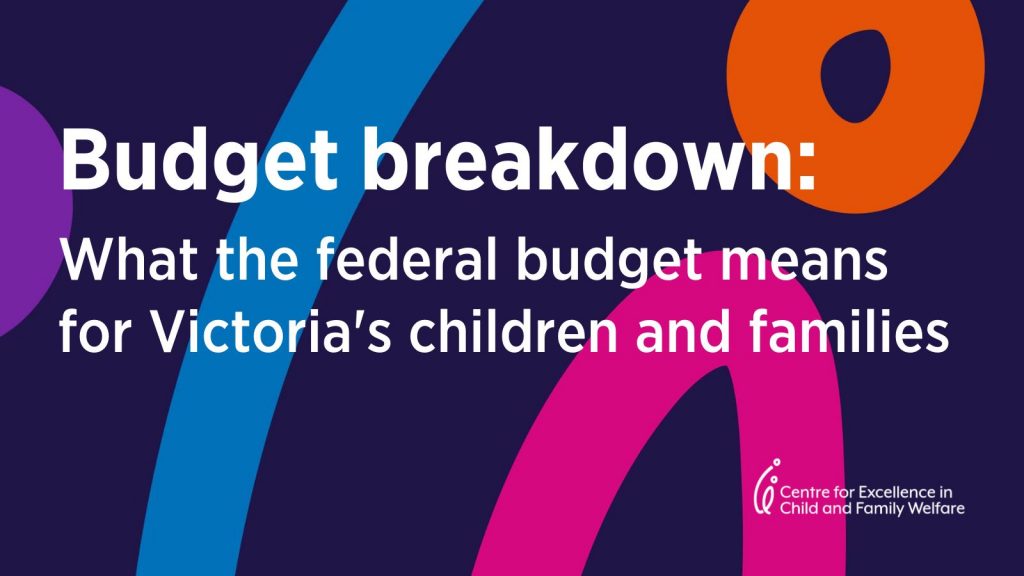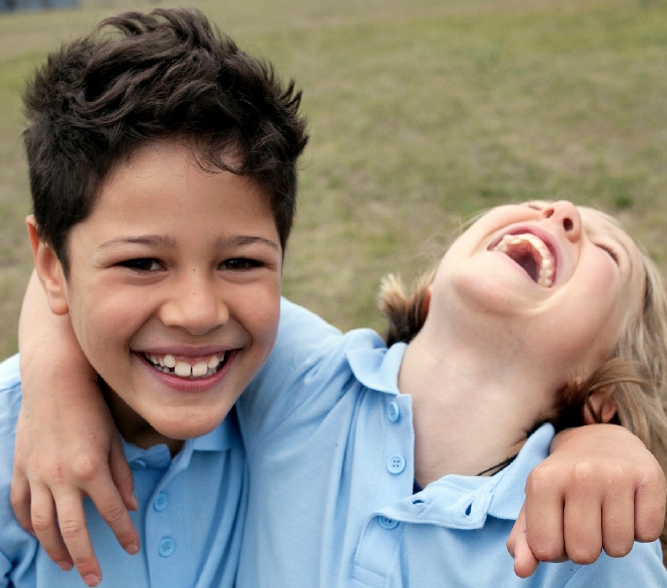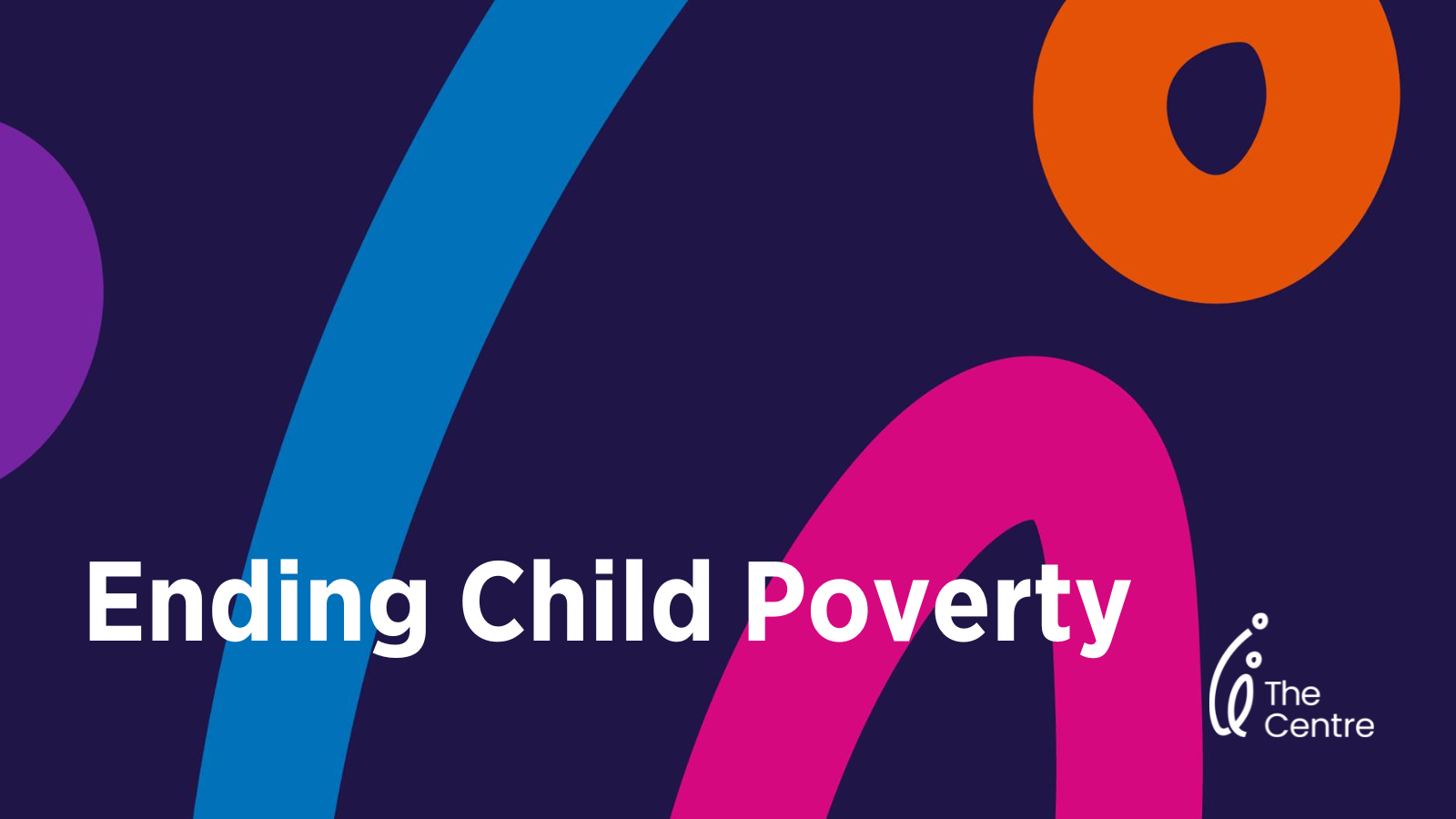Measures relevant to the child and family services sector
The Federal Budget 2020-21 was handed down on Tuesday 6 October. The Centre has prepared this quick overview of the budget measures, both positive and otherwise, that are relevant to your work in the child and family services sector and to the children, young people and families that you support.
Sector funding
- $132.6 million over four years from 2020-21 ($0.2 million in 2020-21) for the Department of Social Services to deliver ongoing funding for frontline social services impacted by the cessation of the Social and Community Services Special Account
Early intervention and parenting
- $40.1 million over three years from 2021-22 to continue Children and Parenting Support Services – Additional Services on an ongoing basis. This measure offers specialised early intervention and prevention support to at-risk children and families with complex needs, including culturally and linguistically diverse families and Indigenous families
Social security
- $2.6 billion for two additional Economic Support Payments of $250 for people receiving a pension and other eligible recipients
- Ongoing funding for the Cashless Debit Card, confirming that it is no longer considered a trial by the government. The payments remain ‘not for publication’
- $9.6 million in 2021-22 to extend Income Management for one year in all 13 current locations across Australia from 1 July 2021 until 30 June 2022
- $25 million over four years from 2020-21 ($9.1 million in 2020-21) to temporarily revise the independence test for those applying for Youth Allowance and ABSTUDY from 1 January 2021. Under the exemption, the six-month period between 25 March 2020 and 24 September 2020 will automatically be recognised as contributing to an applicant’s independence test, regardless of whether they meet employment requirements
- $16.3 million over three years from 2020-21 ($2.9 million in 2020-21) to incentivise seasonal participation in the agricultural industry, by creating a temporary pathway for young people who are seeking to qualify as independent for the purposes of assessing Youth Allowance (student) and ABSTUDY payment eligibility
Financial wellbeing
- $44.4 million over three years from 2021-22 (and $12.9 million per year ongoing) to continue Microfinance, Money Support Hubs and Problem Gambling Financial Counselling measures under the Financial Wellbeing and Capability activity
Employment
- As announced in August 2020, an additional estimated cost of $15.6 billion in 2020-21 will be incurred for the JobKeeper Payment, providing wage subsidies that support employees of businesses and not-for-profit organisations
- $4.0 billion over three years from 2020-21 ($850 million in 2020-21) to accelerate employment growth by supporting organisations to take on additional employees through a 12-month hiring credit. Employers will receive the credit for new jobs created for eligible people aged 16-35 years who have been receiving JobSeeker, Youth Allowance of Parenting Payment for at least a month out of the three months prior to being hired
- Government is making changes to employment programs and funding that will result in savings of $1.4 billion over four years. An employment services package worth $143.7 million over four years will provide targeted support to people who have lost their job due to the COVID-19 pandemic, including measures such as:
- $62.8 million over two years from 2020-21 to establish a Local Jobs Program to coordinate employment and training solutions at a local level in 25 regions across Australia
- $21.9 million over four years from 2020-21 to quickly connect young people (aged 15-24) to specialist youth assistance delivered through the Transition to Work service, and to develop online training to increase their job-ready skills and succeed in the labour market
- $5.7 million over two years from 2020-21 to extend eligibility for the New Business Assistance within the New Enterprise Incentive Scheme program to individuals undertaking part-time work or study or those with caring responsibilities
Low- and middle-income households
- The Government will bring forward the second stage of its Personal Income Tax Plan by two years to 1 July 2020 while retaining the low- and middle-income tax offset (LMITO) for 2020- 21. The top threshold of the 19 per cent personal income tax bracket will increase from $37,000 to $45,000. The low-income tax offset (LITO) will increase from $445 to $700. The increased LITO will be withdrawn at a rate of 5 cents per dollar between taxable incomes of $37,500 and $45,000. The LITO will then be withdrawn at a rate of 1.5 cents per dollar between taxable incomes of $45,000 and $66,667
Family violence
- As announced in February 2020, the government will provide funding over four years from 2020- 21 to deliver Australia’s sexual assault, domestic and family violence counselling service provided through 1800RESPECT, to provide COVID-specific advertising over the Christmas period, and to meet increased demand. The payments are ‘not for publication’
Family law
- $132.1 million over four years from 2020-21 to expedite the handling of family law matter sand other matters in the Federal Circuit Court. This includes measures such as:
- $87.3 million over three years from 2021-22 to maintain funding for family law services funded under the Family Relationship Services Program, following the cessation of the social and community services wage supplementation funding
- $4.8 million in 2020-21 for the Family Violence and Cross Examination of Parties Scheme, which helps protect victims of family violence in family law proceedings
- $1.8 million over four years from 2020-21 to implement Federal Family Violence Orders under the National Domestic Violence Order Scheme
Mental health
- $100.8 million over two years from 2020-21 ($44.2 million in 2020-21) to ensure people with a mental health care plan can access up to 10 additional Medicare-subsidised individual psychological therapy sessions each calendar year
- A further $47.3 million over two years from 2020-21 ($46.1 million in 2020-21) in additional mental health and crisis support services for people experiencing mental illness and distress as a result of the COVID-19 pandemic in Victoria
- As announced in September 2020, $7.6 million over four years from 2020-21 and $1.2 million per year ongoing ($3.3 million in 2020-21) to address inconsistencies in the support provided for families affected by stillbirth or by the loss of a child before their first birthday
- An additional $62.1 million over four years from 2020-21 including $0.6 million per year ongoing ($12.6 million in 2020-21) to improve access to mental health services. This includes $5.0 million in 2020-21 to provide parents, guardians and carers with mental health and career information for students in the context of the COVID-19 pandemic
Child sexual abuse and Redress
- An additional $104.6 million over four years ($25.7 million in 2020-21) to support the delivery of the National Redress Scheme and to support Independent Decision Makers in offering Redress
- $6.7 million over four years from 2020-21 ($1.2 million in 2020-21) to establish a National Memorial for victims and survivors of institutional child sexual abuse
Disability
- An additional $798.8 million over four years from 2020-21 ($284 million in 2020-21) for the National Disability Insurance Agency (NDIA) and the National Disability Insurance Scheme (NDIS) Quality and Safeguards Commission
Education
- $146.3 million over five years from 2020-21 ($17.9 million in 2020-21) for a package of initiatives to improve education outcomes of young Australians, particularly disadvantaged students and those most impacted by the COVID-19 pandemic, and to contribute to social cohesio
Childcare
- $314.2 million in 2020-21 to support Victorian Early Childhood Education and Care (ECEC) services to remain viable as COVID-19 restrictions ease in the state. Support will be in addition to Child Care Subsidy (CCS) payments and continue from 28 September 2020 until 31 January 2021
Adoption
- $6.1 million over three years from 2021-22 to continue the delivery of Forced Adoption Support Services, which provide specialist support to people affected by forced adoption
Content in this quick guide is largely included verbatim from budget paper 2.
Commonwealth of Australia 2020, Budget measures – Budget paper no. 2 2020-21, Australian Government, Canberra.






